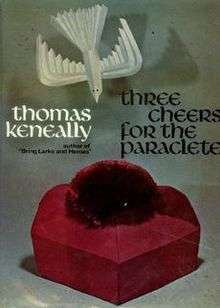Three Cheers for the Paraclete
Three Cheers for the Paraclete (1968) is a novel by the Australian author Thomas Keneally. It won the Miles Franklin Award in 1968.
 First edition | |
| Author | Thomas Keneally |
|---|---|
| Country | Australia |
| Language | English |
| Publisher | Angus and Robertson, Australia |
Publication date | 1968 |
| Media type | Print (Hardback & Paperback) |
| Pages | 240 pp |
| ISBN | 0-207-95046-6 |
| OCLC | 40233 |
| 823 | |
| LC Class | PZ4.K336 Th PR9619.3.K46 |
| Preceded by | Bring Larks and Heroes |
| Followed by | The Survivor |
Story outline
After studying overseas for some years a young priest, James Maitland, returns to Australia to teach at a seminary.
Critical reception
In The Canberra Times, John N. Molony is impressed with the book but finds a number of problems with it: "The heart of the novel is about belief, but for this reviewer the transplant didn't work. It is hard to say about a Keneally that his theme was too big for him and that he couldn't incarnate his problem in living characters. Yet in this instance they do not measure up."[1]
Kirkus Reviews found something more in the book: 'Keneally's rather existential points are made with delicacy, at times with a warm, broad humor, and Father James is a vigorous, attractive priest. A thoughtful and sentient book."[2]
Awards and nominations
- Miles Franklin Literary Award, 1968: winner
- C. Weichhardt Award for Australian Literature, 1969: winner
References
| Awards and achievements | ||
|---|---|---|
| Preceded by Bring Larks and Heroes |
Miles Franklin Award recipient 1968 |
Succeeded by Clean Straw for Nothing |